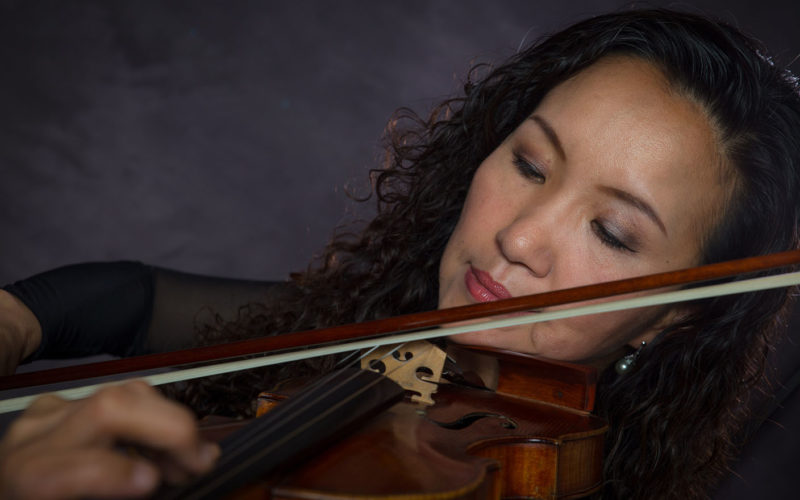Musicians find common language in Bach concerto
BECCA MARTIN-BROWN
bmartin@nwadg.com

Courtesy Photo
In addition to playing with SoNA, Zsolt Eder (left) is concertmaster of the Topeka Symphony Orchestra and the newly appointed professor of violin and viola at Washburn University in Topeka, Kan. Miho Oda Sakon is artist-in-residence at the Suzuki Music School of Arkansas and performs with the Tulsa Symphony Orchestra, the Arkansas Philharmonic Orchestra and SoNA.
It only takes hearing their names to know that Zsolt Eder and Miho Oda Sakon are going to be a study in contrasts.
Both play the violin, and they will share the solo roles in Bach’s Concerto for Two Violins in D Minor when the Symphony of Northwest Arkansas performs March 9. Eder is SoNA associate concert master, and Sakon is principal second for the Fayetteville-based orchestra, but that’s where their stories diverge.
Both grew up in musical homes — Eder in Hungary and then Australia, Sakon in Japan — but Sakon fell further from the family tree. Eder’s parents were violinists, “so it was an easy choice for me.” Sakon’s father was a baritone, her mother a pianist. “I really wanted to learn a different musical instrument which my parents never played.”
Sakon came to the United States from Tokyo to get married. “My husband already started teaching at the University of Arkansas when we met [for the] first time.” Eder moved to Kansas City in 2011 to work on a doctorate in music at UMKC.
“I won a job with the Topeka Symphony soon after arriving there, a position I still hold, and as of 2018, I also teach violin at Washburn University in Topeka,” he explains.
Eder has been listening to jazz for fun lately — “the pianist Oscar Peterson for example. And I love the great American songbook, as performed by people like Frank Sinatra and Ella Fitzgerald.” Sakon’s current favorites are “Baby Shark,” which she says is “a very popular song among children [and] great material to teach young violinists actually,” and György Ligeti’s “Mysteries of the Macabre” performed by Barbara Hannigan.
But both agree that the Bach concerto is “heavenly.”
“It has been said that Bach’s music is the perfect combination of emotion and intellect,” enthuses Eder. “He loved to write complex, multi-layered music, especially fugues, and the influence of that certainly comes out in outer sections of the double concerto. The middle section — the slow movement — is pure beauty with its soaring melodies.
“In Bach,” he adds, “everything is interesting: the two solo parts are interesting, but the bass line and the orchestra parts are also really engaging. It’s like having a multi-layered cake with different flavors.”
“I would like to say especially to young violinists who are learning in the Suzuki Method, it will be a very special opportunity to listen to the whole of movements of the concerto with orchestra,” adds Sakon, who teaches at the Suzuki Music School of Arkansas. “The students learn only the first movement [and] therefore, some don’t know the existence of the second and third movements. It will be very [worthwhile] to listen to the heavenly second movement and energetic third movement at the coming SoNA concert.”
Sakon suggests checking out a recording of the music before the concert to feel more comfortable as an audience member. Eder says it doesn’t matter. “There’s something really impressive and exciting about watching and hearing that many musicians on stage playing together,” he says. “The sound experience is better than any surround-sound system you might have at home. I would encourage people to come to a concert and hear what it’s like!”
The performance, under the baton of Maestro Paul Haas, also includes “High Windows” by Christopher Cerrone and Beethoven’s Symphony No. 2 in D Major.
“Christopher Cerrone has quickly made an important place for himself in the orchestral catalog,” Haas says of the composer, who won a Pulitzer Prize nomination for music in 2014 at age 30 and won the Rome Prize in composition the following year.” And “Beethoven’s second symphony delivers humor and charm as it points us toward springtime.”
__
FAQ
Masterworks III:
Bach & Beethoven
WHEN — 7:30 p.m. March 9
WHERE — Walton Arts Center in Fayetteville
COST — $32-$55
INFO — 443-5600
FYI — SoNA will also perform Masterworks III at 3 p.m. March 10 in the Berry Performing Arts Center at John Brown University in Siloam Springs. Tickets are $5-$15 at 524-7382.



